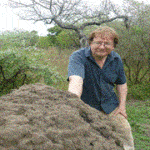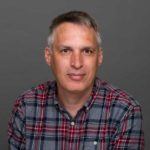-
Asked by anon-340888 on 8 Mar 2024. This question was also asked by band1dorr.0
Question: What is a piece of advice about entering the science field that you wish you had known at 18?
- Keywords:
-
Rebecca Williams answered on 8 Mar 2024:
A great question – I wish I’d know how important learning to fail well is as a scientist. At school I always wanted to get everything right first time and my ability to do that was a marker of my success. That just isn’t possible as a scientist. My job requires me to learn almost constantly and that also means getting a lot of things wrong, and then trying again.
-
Amy Rattenbury answered on 8 Mar 2024:
I wish I’d known the importance of embracing failure and uncertainty. Early on, I thought success in science meant always having the right answers and making no mistakes. However, I’ve learned that science is much more about exploring the unknown and learning from failure. Each mistake or unexpected result is a chance to grow and discover something new. Being comfortable with not knowing everything and seeing failure as a stepping stone rather than a setback is crucial. This mindset fosters resilience, curiosity, and the courage to take risks, which are essential for any scientist. So, my advice is to embrace the journey, including the failures, as they’re key to achieving success in science.
-
Martin Minarik answered on 8 Mar 2024:
I’d say try and explore how the industry works in your chosen field. I know people who took advantage of internships and short placements in biotech companies while at uni. Then, even if you prefer staying in academic research, you always have some past experience in commercial research and know how things work in the industry in case it later turns out academia isn’t working for you for any reason. A lot of my colleagues (and, occasionally, me) are unhappy with work-life balance and job uncertainty in academia but find it daunting to switch to industry because they have no idea what to expect.
-
Martin McCoustra answered on 8 Mar 2024:
That’s a very difficult question to answer. I was very lucky in that the teachers who advised me over choosing subjects at university were very sensible. Also my parents didn’t push me in any particular direction. I was left to make my own choices and I firmly believe that if you make a choice then live with it! I was lucky to make what I think were the right choices.
-
Michael C Macey answered on 8 Mar 2024:
Great question – I wish I had known to talk to lecturers at university more! Now I am a lecturer, I know that lecturers are looking for promising students, people to offer internships too and people who want to stay in science to work on their projects! If I had known that earlier I might have not been too worried about reaching out and emailing lecturers I liked when I first went to University.
-
Ravindu Ranaweera answered on 10 Mar 2024:
For me, I would say learn to code and learn Excel. I was lucky as I had some experience. I saw a lot of my peers struggling to learn these to complete their work (they had to spend extra time learning before they could actually get to the work). Also, be ready to fail…things don’t always go as planned but learning from your mistakes will get you where you need to go.
-
Steve Potterill answered on 10 Mar 2024:
When I was at school, I found maths relatively easy. When I was at university studying physics, I assumed my maths skills were good enough to get me through. However, my physics studies were impeded because I came across a couple of maths aspects that I struggled with.
So, my advice is: no matter how good you think you are at a subject, be diligent and work through everything to prepare yourself for what may come next. (Also, I mistakenly thought I needed to solve everything by myself: I should have asked for help earlier than I did). -
Bruno Silvester Lopes answered on 10 Mar 2024:
Find the right people that inspire and motivate you. As you learn and move ahead, make sure that you give back and train others! Learn to do things by yourself but also as part of a wider team. Make sure that you don’t give your 100% but actually give >100% in anything that you do. Appreciate the time of others and tell them that you are grateful. It is not less than gold!
-
Sandra Robertson answered on 10 Mar 2024:
There are soo many options, so don’t become fixated on a signal role or job title. Keep your options open as long as possible while studying, until you find the right fit for you.
-
Emma Weir answered on 13 Mar 2024:
It’s okay not to know exactly what you want to focus on or do in the future! I started university knowing I liked human biology, but with no real plans on what to specialise in or do as a job after. I narrowed down working in neuroscience because I hated some of the other subjects, and only decided to work in science research when I realised how much I enjoyed doing experiments
-
Eileen Xu answered on 13 Mar 2024:
That it’s OK (and normal!) to make mistakes, or have things go wrong – looking after your own health is the most important thing!
Being a scientist doesn’t have to look one particular way, so even if you don’t look/feel like a “proper scientist” it doesn’t mean you’re doing something wrong or don’t belong. I still sometimes feel like I’m not a “proper scientist”, even though it’s my job! There’s so many different areas of science and different ways of doing research, so if the first topic you land on doesn’t work for you, switch to another. There’s no right path into science so don’t worry if you don’t get the degree you wanted, or the funding you wanted – any and all paths into science are valid. Don’t give up 🙂
-
Zoe Vance answered on 13 Mar 2024:
Similar to the others that talk about it being okay to fail, I think I would like to tell my 18 year old self to be a lot less concerned with looking smart/not looking stupid. Failure is very much a part of learning, especially in science, as is needing to ask other people for help. Maybe the only thing I regret in my career path is not properly taking advantage of the experience of people around me because I wanted to seem like I could just figure everything out myself. I can, for the most part, but it’s not always the best method of learning and it would have saved a lot of tears if I’d been more willing to just ask for help.
-
Alastair Henniker-heaton answered on 13 Mar 2024:
I would tell myself not to fear failure but embrace it.
Life is all about learning and we never stop learning new things. If you want to try new things and learn about them, then chances are you’re going to make mistakes. Don’t look at them as setbacks but instead learning and experience. Next time round you’ll do things differently and have a better outcome.
One phrase I try to live by is… “if you’re not making mistakes you’re not trying hard enough”.
The important thing is making sure you have a safe environment to fail within.
-
Alyson Downham answered on 13 Mar 2024:
You don’t have to have it all mapped out, things happen, things change, be willing to learn and to adapt. Don’t be afraid to ask for help.
-
Christie Waddington answered on 15 Mar 2024:
There are so many different career options in science than just working in a research lab. Always go with what you find interesting, rather than what you think you should be doing. If you enjoy your job, you’re always more likely to succeed!
-
Hayley Pincott answered on 22 Mar 2024:
I have to say that I wasn’t prepared for the bad side of my work. I work in biomedical science and we help to diagnose cancer. So while some of our patients get better sadly there are some cases where your best will never be good enough to help them get better. I still struggle with this and it still upsets me, all I can do is think that I’ve helped to empower a patient to decide what management plan they’d like.
-
Michael Schubert answered on 23 Mar 2024:
I wish I had known just how many different science careers and options there are, and how many different jobs involve science! I felt a little bit pressured to aim for a specific type of science career (an academic professor with a research laboratory), but it ended up not being exactly what I wanted. If I had known more about the types of careers I could have had, I could have started working toward the one I really wanted earlier.
Related Questions
How long have you been a scientist for
how is it like to be a biologist
if you where not a scientist what would you be?
What would you suggest for young school students to do to become a good scientist ? for example what to learn about .
Hi were you planning on this when you where a child
If you could restart- would you choose the same career path?
how long have you been working as a stem ambassador
im just wondering since your a marine biologist can i have a good company that does the kind of things you do?
What inspired you to get into the industry and what advice do you have for upcoming Computer Scientists?
How can I become a vet or have a vetinary career?
Latest Questions
-
How do you make new drugs
-
how many plants do you study normally?
-
what happens when a person whos sick gets a DNA while the person is sick what do you do
-
What are polysaccharides?
-
how many nuclear explosions happen in the world
-
how does your job effect your daily life ? (2 Comments)
-
why does nuclear waste glow in the dark? (1 Comment)
-
how to you deal with problems you come across when doing your research? (2 Comments)
-
If you have been emotionally invested (focusing on anxiety if you suffer with it, dementia etc) do you find it
-
what motivates you to carry out your research? (1 Comment)
Latest Comments
-
how does your job effect your daily life ? (2 comments)
-
why does nuclear waste glow in the dark? (1 comment)
-
what motivates you to carry out your research? (1 comment)
-
how to you deal with problems you come across when doing your research? (2 comments)
-
How long have you been a scientist for (2 comments)







Comments
Paul commented on :
Focus. Five years for A-levels and uni is not a long time (although it feels it at the time)! Treat your uni days like a job and you will do well.
Alexander dB commented on :
For me it would be to embrace failure and uncertainty. Also, perfect is the enemy of done.
Edward commented on :
Ability to program, even badly, is still very useful. Your code can be ugly but if it works, who cares. The other aspect is failing. You will fail a lot and it doesn’t mean you aren’t very good, it just means there is a lot to learn and a lot that is new to explore.
Graeme J commented on :
There will be good and bad days. There will be many failures ahead. It doesn’t mean that you are not doing something worthwhile, it just means that you are at the boundary of the current knowledge
Sharron K commented on :
i wish i had known at 18 that you dont have to have it all planned out to the last detail. great if you do, but its also ok to still be unsure of where you want to go and still be thinking about options. you can always modify your path and to fail at 1st at something doesnt always mean that door is closed forever.
i failed chemistry at A-level ! so i persued a degree in biology and years later i am working as a chemist and im good at it. but ask me back then if i could see myself working as an analytical chemist and i would have said no way.
Eileen commented on :
“Your code can be ugly but if it works, who cares” is going to be my new motto!